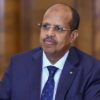NAIROBI, Kenya, Oct 6 – The circus between the government and the International Criminal Court [ICC] continued on Wednesday, with the government asking for more time before it hands over minutes of security meetings held prior to the violence that rocked the country in 2008.
Attorney General Amos formally wrote to the ICC on Wednesday asking for two more weeks before the specific minutes investigators were asking for are submitted.
A source familiar with the correspondence between the government and ICC told Capital News that Mr Wako who is the State\’s chief legal advisor had sent the request.
"The government is cooperating with the ICC, there is even a letter that was sent to the ICC today [Wednesday] asking for two weeks before the documents are given out. We have nothing to do but to wait because the documents ICC is asking are sensitive," the official privy to the ICC process said.
As he spoke, Five ODM MPs from Rift Valley turned the ICC heat on their own party, saying the Hague-based court should investigate mass action planned at the ODM headquarters that resulted in chaos at the height of the post-election violence.
The MPs claimed that the Pentagon, which is the party\’s top leadership, held secret meetings at which mass action and violence was organised.
The MPs Isaac Ruto, Charles Keter, Julius Kones, Benjamin Langat and Zakayo Cheruiyot said ODM should now submit the minutes of meetings held before the violence escalated to the International Criminal Court.
The ICC has already requested minutes of security meetings held by various state officers during the time of the crisis.
In Mr Wako\’s letter to The Hague, he informed the ICC that a High Court Judge had been appointed to help top government officials record statements with ICC investigators.
ICC sleuths were in the country a fortnight ago but were unable to interrogate three Provincial Commissioners and Police chiefs who were at the helm in three provinces shortly before and during the post election violence.
The detectives who have since left Kenya had wanted to specifically question the officials on the security measures they put in place during the period.
They also wanted to know if the officials were acting under any specific government policies specifically in dealing with the violence at the time and if it was anticipated.
Security forces are blamed for the killing of some 400 people who were shot dead during the post election violence.
The Commission of Inquiry that dealt with the cases said about 1,300 people were killed and nearly half a million others displaced.
Apart from the 400 who were shot dead by security forces, the rest were killed as rival communities clashed immediately after President Mwai Kibaki was declared winner in the hotly contested polls.
It was widely expected that the PCs and PPOs would record statements with the ICC investigators before a judge, as soon as one was appointed.
One of the lawyers picked up by the government to represent the PPOs and PCs told Capital News that even when the investigators return, their clients would not rush to give them statements.
"This is a legal process. The law must be followed to the end. Rules and regulations of taking the evidence must be formulated," the lawyer who asked to remain anonymous said.
"They [ICC investigators] are not around, I understand they went back and are expected here in the course of next week. Once they are here I am sure the regulations will be formulated," he said and asked for patience.
Our source is among four lawyers picked up by the government to represent three PPOs and three PCs who are lined up for questioning.
The lawyers include Evans Monari, Ahmednasir Abdullahi, Ken Ogeto, and Gershom Ottachi.
In the opinion of the lawyer, the investigators are seeking evidence which they will use to convince judges at The Hague that there was \’State organisational policy\’ in the post election violence before warrants are issued.
The ICC has clearly indicated it is investigating crimes against humanity in Kenya and the judges cannot issue arrest warrants against potential suspects unless the Prosecutor proves that there was an element of organisational policy in the case.
"In the context of a crime against humanity, there must be an element of organisational policy. As it is, the ICC does not have that evidence… that is why they want to speak to the PCs and PPOs. It is the same reason they are seeking for minutes of security meetings held prior to the chaos," the lawyers said.
He cited Article 7 [2][a] of the Rome Statute which states that for a crime to amount to a "crime against humanity", it must be made "pursuant to or in furtherance of a State or organisational policy".
"This element was lacking in the evidence Mr Ocampo presented to the Pre-Trial chambers when he was seeking for authorisation. You remember one of the judges dismissed the case because he was not convinced," the lawyer added.
"Ocampo is worried that the same judge or another one will raise these issues again at some point when he applies for arrest warrants because of the jurisprudence that lacked in the previous application," he said.
Article 7 [2][a] of the Rome Statute demands that there must be involvement of the State or \’State like\’ actors to be blamed for omissions and commissions in incidents leading to violence.














































